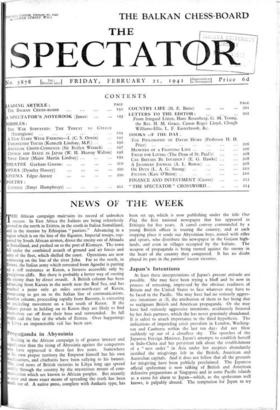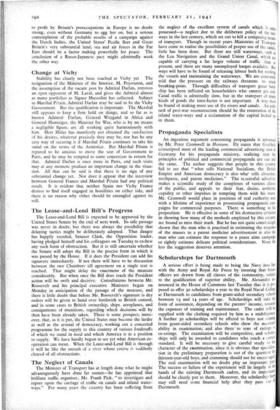Japan's Intentions
At least three interpretations of Japan's present attitude are possible. She may have been trying a bluff and be now in process of retreating, impressed by the obvious readiness of Britain and the United States to face whatever may have to be faced in the Pacific. She may have had no seriously aggres- sive intentions at rll, the attribution of them to her being due to malignant British and American propaganda. Or she may have had seriously aggressive intentions, assiduously fostered by her Axis partners, which she has never genuinely abandoned. It is safest to attach importance to the third .hypothesis. The indications of impending crisis prevalent in London, Washing- ton and Canberra within the last ten days did not blow suddenly up out of a cloudless sky. The speeches of the Japanese Foreign Minister, Japan's attempts to establish herself in Indo-China and her persistent talk about the establishment of a " new order " in Asia under her auspices abundantly justified the misgivings felt in the British, American and Australian capitals. And it does not follow that all the grounds for misgiving have been publicly proclaimed. The Japanese official spokesman is now talking of British and American defensive preparations at Singapore and in some Pacific islands as a cause for alarm to Japan—which, as the spokesman well knows, is palpably absurd. The temptation for Japan to try to profit by Britain's preoccupations in Europe is no doubt strong, even without Germany to egg her on, but a serious contemplation of the probable results of a campaign against the Dutch Indies, the United States' Pacific fleet and Great Britain's very substantial land, sea and air forces in the Far East should be a factor making powerfully for peace. The conclusion of a Russo-Japanese pact might admittedly work the other way.































